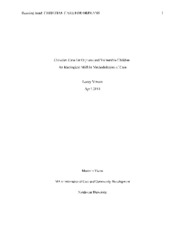Christian Care for Orphans and Vulnerable Children: an Ideological Shift in Methodologies of Care
Abstract
Following the Biblical instruction to serve the orphaned and vulnerable, many members and congregations of the Christian Church have traditionally supported and established residential care for orphaned and vulnerable children. However, the propensity of the Christian Church to support residential care may stem from an all-consuming ideology of providing structure to perceived chaos. Based on current research, most residential care models do not provide adequate care and environments for children to develop properly (Delap, Georgalakis, & Wansbrough-Jones, 2009; Williamson, 2004; Williamson & Greenburg, 2010). Experts have endorsed a shift in care methodologies for orphaned and vulnerable children (Miles & Stephenson, 2001; Oswald & Forbes, 2009; Williamson & Greenburg, 2010) and suggested community development and capacity building, kinship and foster care programs, and family reunification as some alternative responses to orphaned and vulnerable children. The Christian Church must prayerfully consider the importance of an ideological shift from residential care towards holistic models of family and community-based care for orphaned and vulnerable children to experience the shalom of the family.
Contents
Traditional Responses to Orphaned and Vulnerable Children
Are Traditional Responses Working?. Residential Care Facilities Are Not the Best Care Model; Cost; Stigmatization; Lack of Cognitive and Emotional Development
Is an Institutional Response Ideological?
Alternative Responses for Orphaned and Vulnerable Children. Shalom of the Family; Community Development and Capacity Building; Kinship and Foster Care; Family Reunification
Original item type
Microsoft Word (DOCX)
Original extent
36 pages
Collections
Copyright
This original work is protected by copyright. Copyright is retained by the author(s). Works may be viewed, downloaded, or printed, but not reproduced or distributed without author(s) permission.


 Maintained by the Northwest University Library
Maintained by the Northwest University Library